Unit 2 Language Reading(2):English and its history 课件(31张)
文档属性
| 名称 | Unit 2 Language Reading(2):English and its history 课件(31张) |
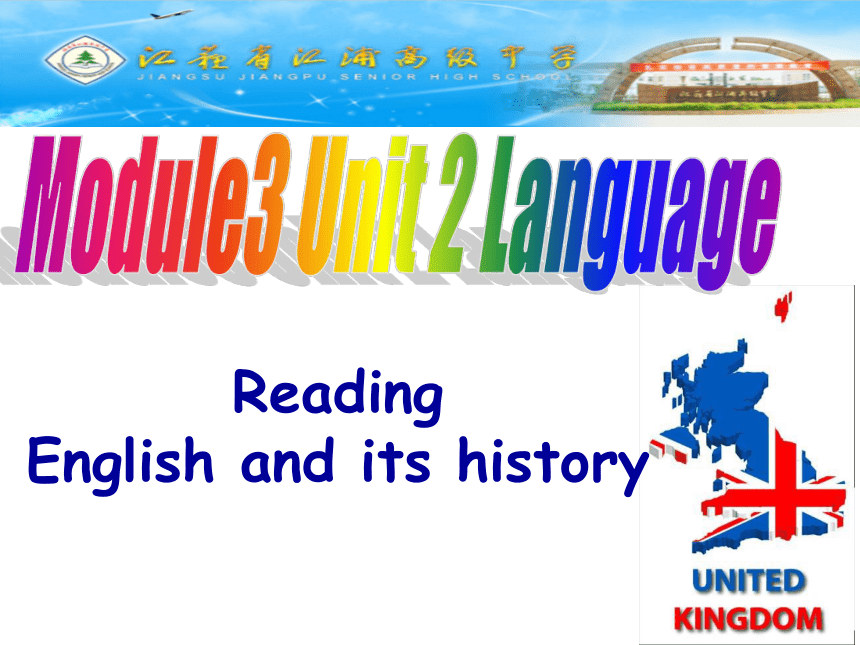
|
|
| 格式 | zip | ||
| 文件大小 | 3.2MB | ||
| 资源类型 | 教案 | ||
| 版本资源 | 牛津译林版 | ||
| 科目 | 英语 | ||
| 更新时间 | 2019-07-24 00:00:00 | ||
图片预览

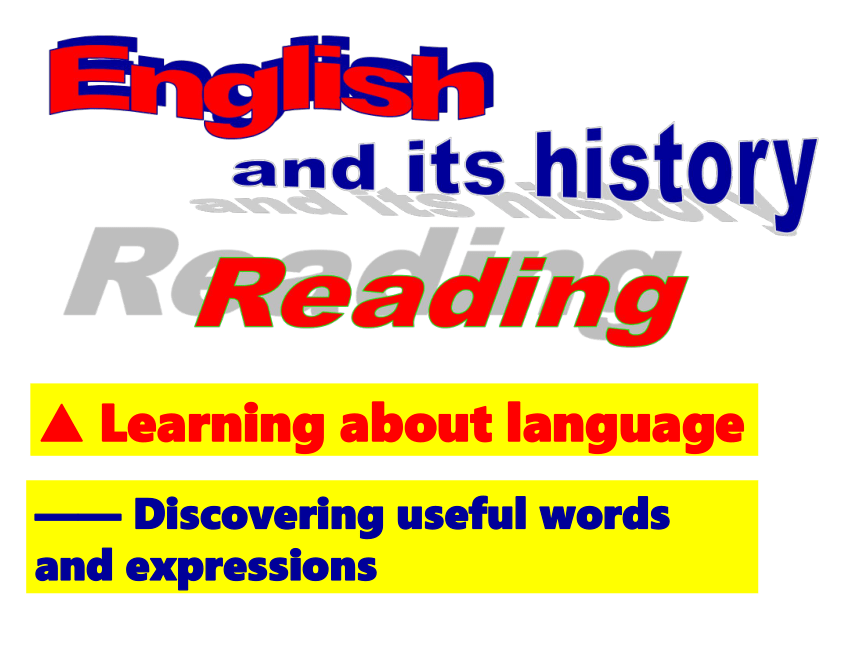
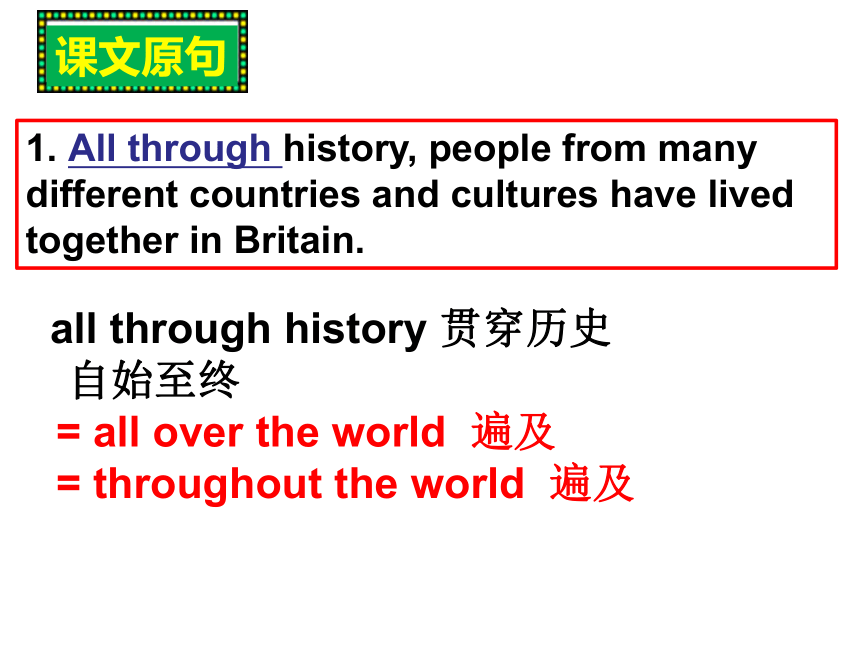
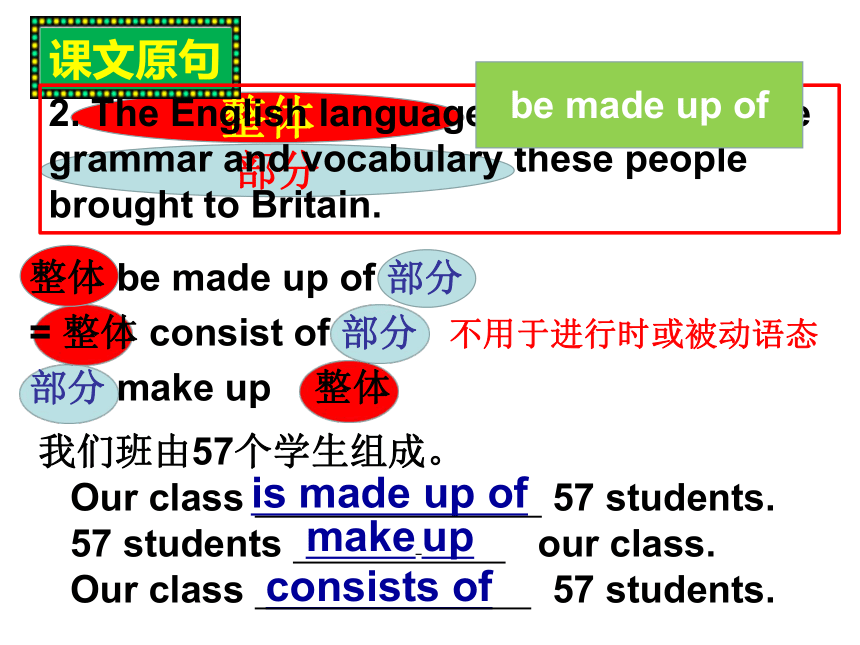
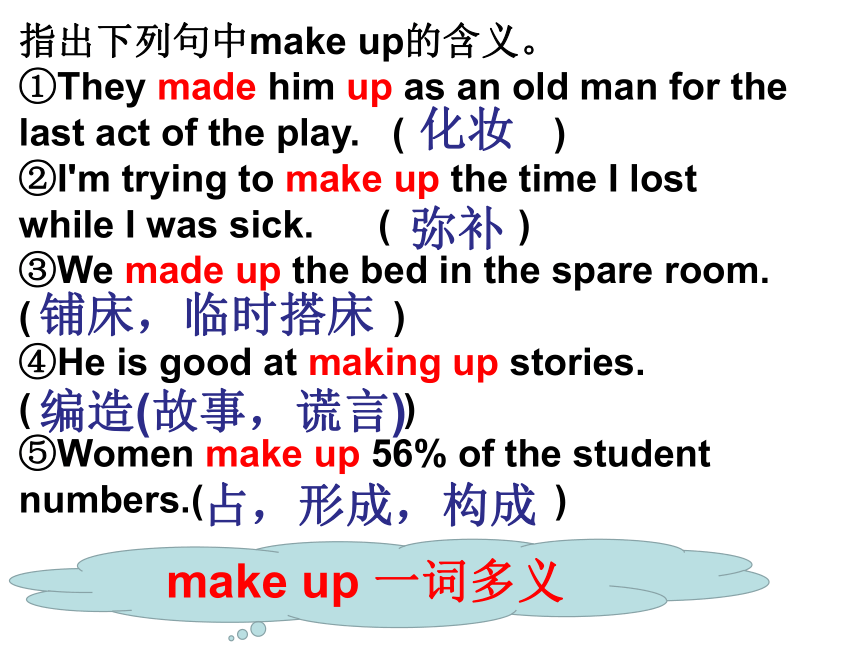
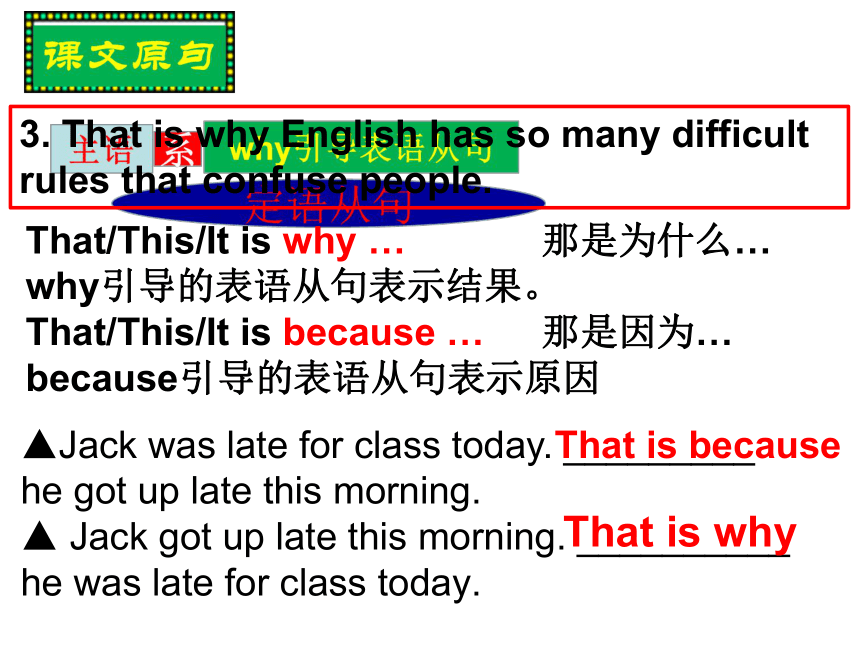
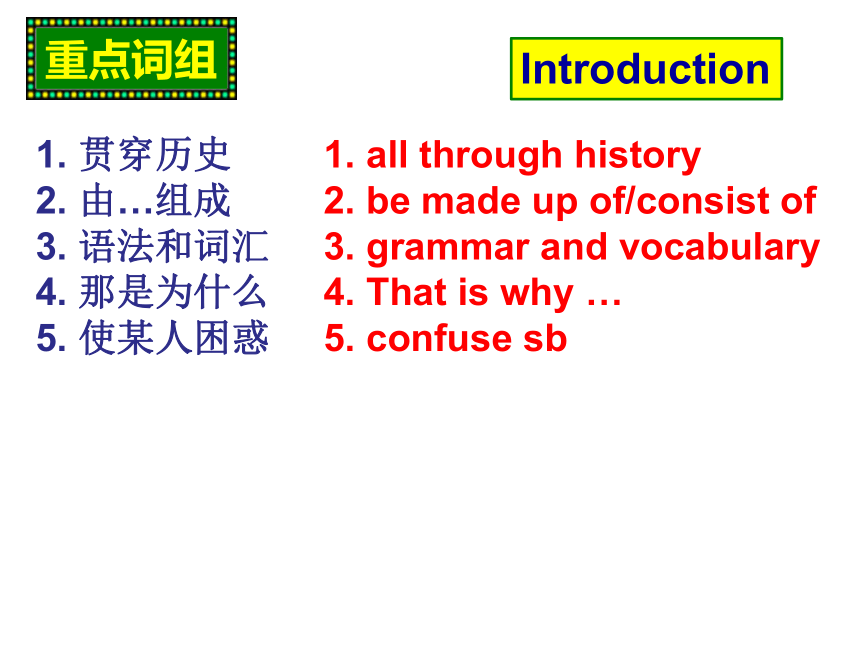
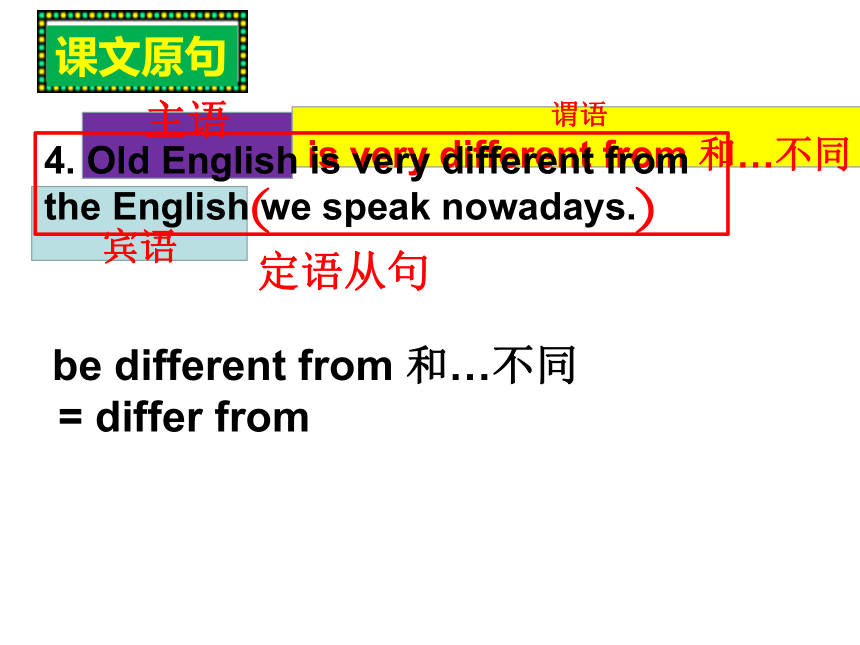
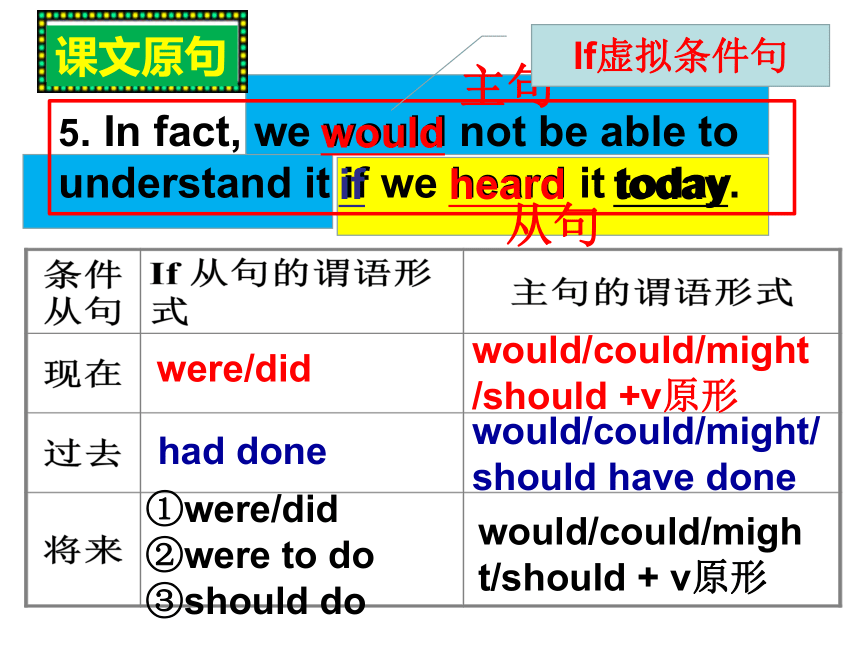
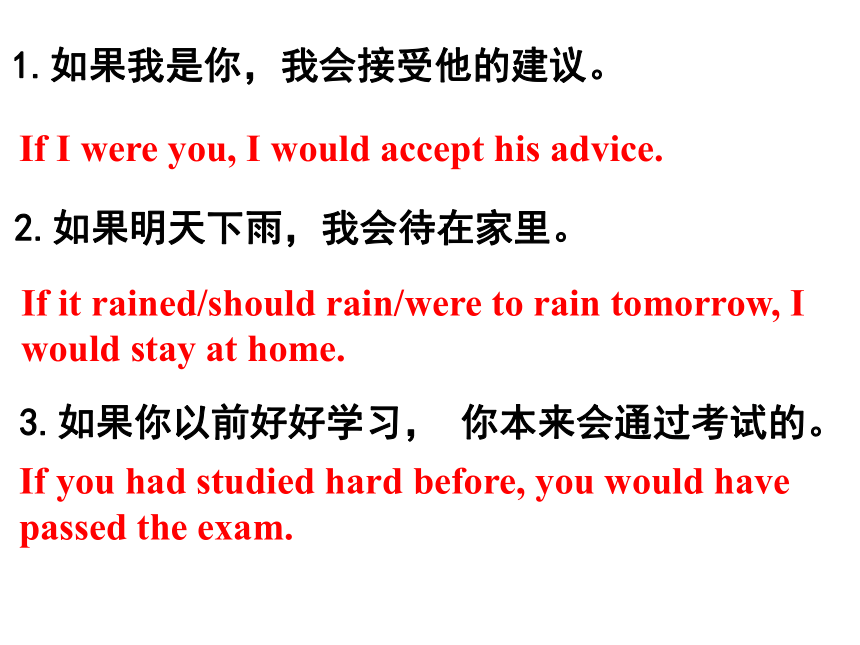
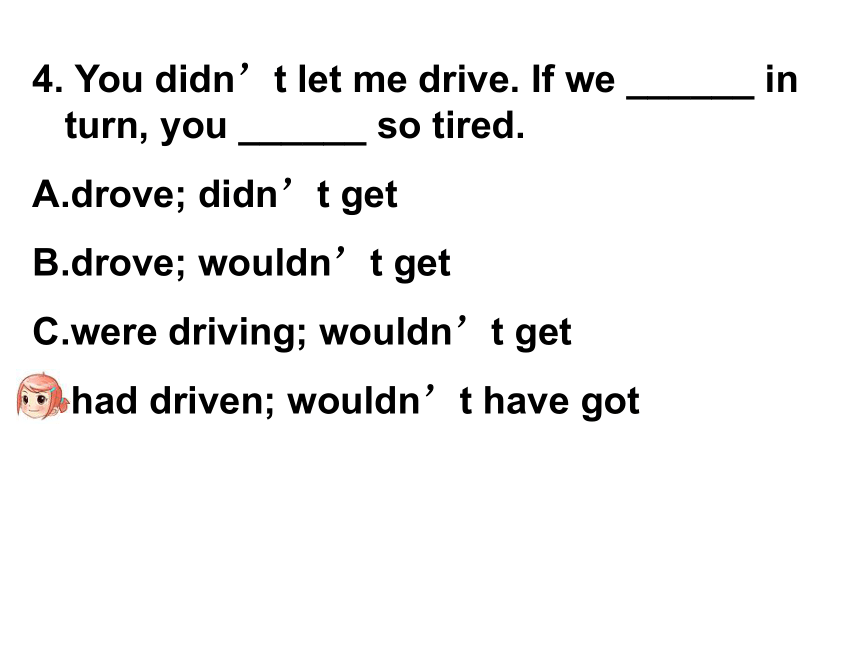
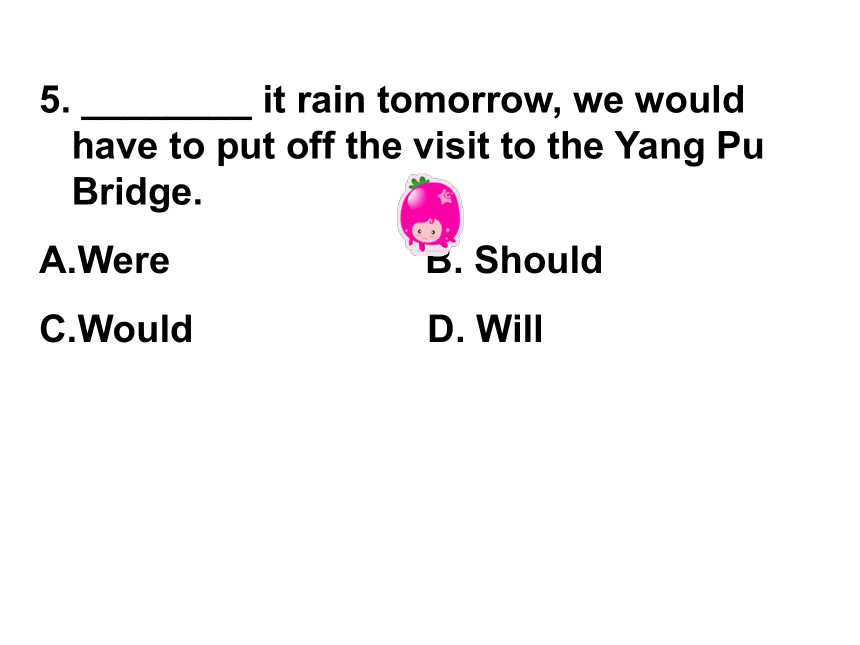
文档简介
课件31张PPT。Module3 Unit 2 LanguageReading
English and its historyEnglishReadingand its history▲ Learning about language—— Discovering useful words and expressions课文原句1. All through history, people from many different countries and cultures have lived together in Britain. all through history 贯穿历史
自始至终
= all over the world 遍及
= throughout the world 遍及整体整体 be made up of 部分
= 整体 consist of 部分 不用于进行时或被动语态
部分 make up 整体
is made up ofmake upconsists of课文原句部分2. The English language is made up of the grammar and vocabulary these people brought to Britain.be made up of我们班由57个学生组成。
Our class 57 students.
57 students our class.
Our class 57 students.
指出下列句中make up的含义。
①They made him up as an old man for the last act of the play. ( )
②I'm trying to make up the time I lost while I was sick. ( )
③We made up the bed in the spare room. ( )
④He is good at making up stories. ( )
⑤Women make up 56% of the student numbers.( )
化妆弥补铺床,临时搭床编造(故事,谎言)占,形成,构成 make up 一词多义That/This/It is why … 那是为什么…
why引导的表语从句表示结果。
That/This/It is because … 那是因为…
because引导的表语从句表示原因▲Jack was late for class today. _________
he got up late this morning.
▲ Jack got up late this morning. __________
he was late for class today.That is becauseThat is why3. That is why English has so many difficult rules that confuse people.1. all through history
2. be made up of/consist of
3. grammar and vocabulary
4. That is why …
5. confuse sb1. 贯穿历史
2. 由…组成
3. 语法和词汇
4. 那是为什么
5. 使某人困惑重点词组Introduction主语
谓语
is very different from 和…不同
宾语( )
定语从句课文原句4. Old English is very different from the English we speak nowadays. be different from 和…不同
= differ from
从句主句
课文原句5. In fact, we would not be able to understand it if we heard it today.If虚拟条件句 were/didwould/could/might/should +v原形 had donewould/could/might/should have done①were/did
②were to do
③should dowould/could/might/should + v原形 would
if heard todayIf you had studied hard before, you would have passed the exam.1.如果我是你,我会接受他的建议。2.如果明天下雨,我会待在家里。3.如果你以前好好学习, 你本来会通过考试的。If I were you, I would accept his advice.If it rained/should rain/were to rain tomorrow, I would stay at home.4. You didn’t let me drive. If we ______ in turn, you ______ so tired.
drove; didn’t get
drove; wouldn’t get
were driving; wouldn’t get
had driven; wouldn’t have got5. ________ it rain tomorrow, we would have to put off the visit to the Yang Pu Bridge.
Were B. Should
C.Would D. Will occupy—occupied— occupied
①占领,侵占;②占据(时间,空间);③使忙碌
The table occupied too much room.
The enemies occupied the city.
The meeting will occupy half an hour.
忙于/专心于某事
occupy sb./oneself in doing sth/with sth.
be occupied in doing sth. /with sth.
He occupied himself in doing homework.7. Both the English language and the English people are named after the Angles...(P10)英语语言和英国人都是以盎格鲁命名的.......name A after B 根据/按照B命名A
= A is named after B
The city was named after the hero. 【拓展】in the name of... 以...的名义;
(也作in one's name)
call sb names 辱骂某人
know sb by name 知道某人的名字【Exercises】1)This island was its finder.(该岛以其发现者的名字命名的。)
2)He attended the party
his father.(他以他父亲的名义参加聚会。)
3)My grandpa told me not to .(我爷爷叫我不要骂他。)
4)I only know him .(我只知道他的名字。)named afterin the name ofcall him namesby name1. be different from
2. in fact
3. be able to
4. before the middle of the 5th century
5. consist of
6. a mixture of
7. aside from
8. at the end of …
9. bring sth with sb
10. by the 10th century
11. the official language
12. feel puzzled about
13. This is because …
14. similar meanings1. 和…不同
2. 事实上
3. 能够做…
4. 5世纪中期前
5. 由...组成
6. 混合,结合体
7. 除…之外还
8. 在…结尾/尽头
9. 某人随身带来
10. 到10世纪为止
11. 官方语言
12. 感到困惑
13. 这是因为…
14. 相似的意思同位语
系
表语
主语
课文原句8. The most important contribution was from the Normans, a French- speaking people who defeated England and took control of the country in 1066.n. 贡献
make contributions to
为…做贡献 a … people 一个…的名族(
)定语从句 contribution a
people8. take control of 控制;
取得对....的控制【拓展】lose control of 失去对。。。的控制
(be) in control of sth 掌管;控制
(be) out of control 无法管理;失去控制
under control 被控制住control V. 控制;操作;克制
①She is skillful enough to control the machine.
②The British government at that time controlled the island.
③You must learn to control your temper.
lead to sth. / lead to doing/ lead to sb doing
① = result in = cause 引起, 导致, 造成
His carelessness led to the big fire.
Smoking can lead to lung cancer. .
② 通往,通向
This road leads to the hotel.
All roads lead to Rome.10. replace 替换,取代,代替
A取代B/A代替B
A replace B
= A take the place of B
= B is/are replaced with/by A
课堂上,电脑将永远不会取代老师。
Computers will never replace teachers in the classroom.
Computers will never take the place of teachers in the classroom.
Teachers will never be replaced by computers in the classroom.replace vt.
1. 取代;代替
Electric lights have replaced candles.
电灯已经取代了蜡烛。
2. 把……放回(原处)
She replaced the receiver.
她将听筒放了回去。
3. 归还;偿还
You’ll be expected to replace any broken glasses.
玻璃杯如有损坏,要负责赔偿。课文原句11. After the Norman Conquest, many English people worked as servants who raised animals.诺曼征服 the Norman Conquest worked as worked as 充当,担任,起…作用
= fun_ction as
= serve as
= act as
raised
饲养The sofa will serve as a bed at night.
Can you act as our guide tomorrow?主语 谓语 宾语 定语从句
▲ ▲ ▲11. raise animals
one’s family
crops
your hands
one’s voice
money for …
people’s awareness of …
objections at the meeting
(反对)
(vt.)①饲养 = keep
②抚养 = support
③种植
④举起
⑤提高
⑥为…筹集资金
⑦唤起/引起
⑧ 提出 raise 一词多义 12. However, by the latter half of the 14th century, English had come into widespread use among all classes in England. (P47)come into use 开始使用
come into widespread use 开始广泛使用
come into power 执政,当权
come into view 映入眼帘【拓展】常用的use短语有:
be in use 在使用
make use of 使用;利用
out of use 停止使用
be of great/no use 很有用处/无用【归纳】by表示“到……时为止”时
by + 现在时间 现在完成时(have/has done)
by + 过去时间 过去完成时(had done)
by + 将来时间 将来完成时(will have done)1. play a part in...
2. a French-speaking people
3. defeat/beat sb.
4. take control of
5. lead to
6. on the other hand
7. result in
8. work as
9. make contributions to
10. way of doing
11. instead of
12. add...to...
13. by the latter half of
14. come into use1. 在...中起到作用
2. 一个说法语的民族
3. 击败某人
4. 控制
5. 导致,通向
6. 另一方面
7. 导致
8. 充当,担任...
9. 对...做出贡献
10. 做某事的方式
11. 代替,而不是
12. 把...加到...里面
13. 到...下半叶
14. 开始被使用 middle English后置定语
介+ whether引导的宾语从句
表系主语
sth./sb. + is + adj. + to do (to-v主动表被动 )
Japanese is not difficult to learn.
The man is hard to deal with.
The room is comfortable to live in. 13. The question of whether English will keep on changing in the future is easy to answer. whether whether whether Whether whether/if知识点津It’s certain that… "肯定,一定"(此处不可用
sure)此句型中,it是形式主语,that引导的从句是真正的主语
It’s certain that he will come tomorrow.
be certain to do sth. 一定会做……
He is certain to live to 100.
be certain of/ about 对…有把握,确信
They are certain of success.
= They are certain that they will succeed.
1. because of
2. go through
3. during this period
4. keep (on) doing
5. in the future
6. It is certain that...
1. 因为,由于
2. 经历,通过
3. 在这个时期
4. 继续做某事
5. 将来
6. ...是确定的modern English If you talk to a man in a language he understands, that goes to his head!
If you talk to him in his own language, that goes to his heart.
English and its historyEnglishReadingand its history▲ Learning about language—— Discovering useful words and expressions课文原句1. All through history, people from many different countries and cultures have lived together in Britain. all through history 贯穿历史
自始至终
= all over the world 遍及
= throughout the world 遍及整体整体 be made up of 部分
= 整体 consist of 部分 不用于进行时或被动语态
部分 make up 整体
is made up ofmake upconsists of课文原句部分2. The English language is made up of the grammar and vocabulary these people brought to Britain.be made up of我们班由57个学生组成。
Our class 57 students.
57 students our class.
Our class 57 students.
指出下列句中make up的含义。
①They made him up as an old man for the last act of the play. ( )
②I'm trying to make up the time I lost while I was sick. ( )
③We made up the bed in the spare room. ( )
④He is good at making up stories. ( )
⑤Women make up 56% of the student numbers.( )
化妆弥补铺床,临时搭床编造(故事,谎言)占,形成,构成 make up 一词多义That/This/It is why … 那是为什么…
why引导的表语从句表示结果。
That/This/It is because … 那是因为…
because引导的表语从句表示原因▲Jack was late for class today. _________
he got up late this morning.
▲ Jack got up late this morning. __________
he was late for class today.That is becauseThat is why3. That is why English has so many difficult rules that confuse people.1. all through history
2. be made up of/consist of
3. grammar and vocabulary
4. That is why …
5. confuse sb1. 贯穿历史
2. 由…组成
3. 语法和词汇
4. 那是为什么
5. 使某人困惑重点词组Introduction主语
谓语
is very different from 和…不同
宾语( )
定语从句课文原句4. Old English is very different from the English we speak nowadays. be different from 和…不同
= differ from
从句主句
课文原句5. In fact, we would not be able to understand it if we heard it today.If虚拟条件句 were/didwould/could/might/should +v原形 had donewould/could/might/should have done①were/did
②were to do
③should dowould/could/might/should + v原形 would
if heard todayIf you had studied hard before, you would have passed the exam.1.如果我是你,我会接受他的建议。2.如果明天下雨,我会待在家里。3.如果你以前好好学习, 你本来会通过考试的。If I were you, I would accept his advice.If it rained/should rain/were to rain tomorrow, I would stay at home.4. You didn’t let me drive. If we ______ in turn, you ______ so tired.
drove; didn’t get
drove; wouldn’t get
were driving; wouldn’t get
had driven; wouldn’t have got5. ________ it rain tomorrow, we would have to put off the visit to the Yang Pu Bridge.
Were B. Should
C.Would D. Will occupy—occupied— occupied
①占领,侵占;②占据(时间,空间);③使忙碌
The table occupied too much room.
The enemies occupied the city.
The meeting will occupy half an hour.
忙于/专心于某事
occupy sb./oneself in doing sth/with sth.
be occupied in doing sth. /with sth.
He occupied himself in doing homework.7. Both the English language and the English people are named after the Angles...(P10)英语语言和英国人都是以盎格鲁命名的.......name A after B 根据/按照B命名A
= A is named after B
The city was named after the hero. 【拓展】in the name of... 以...的名义;
(也作in one's name)
call sb names 辱骂某人
know sb by name 知道某人的名字【Exercises】1)This island was its finder.(该岛以其发现者的名字命名的。)
2)He attended the party
his father.(他以他父亲的名义参加聚会。)
3)My grandpa told me not to .(我爷爷叫我不要骂他。)
4)I only know him .(我只知道他的名字。)named afterin the name ofcall him namesby name1. be different from
2. in fact
3. be able to
4. before the middle of the 5th century
5. consist of
6. a mixture of
7. aside from
8. at the end of …
9. bring sth with sb
10. by the 10th century
11. the official language
12. feel puzzled about
13. This is because …
14. similar meanings1. 和…不同
2. 事实上
3. 能够做…
4. 5世纪中期前
5. 由...组成
6. 混合,结合体
7. 除…之外还
8. 在…结尾/尽头
9. 某人随身带来
10. 到10世纪为止
11. 官方语言
12. 感到困惑
13. 这是因为…
14. 相似的意思同位语
系
表语
主语
课文原句8. The most important contribution was from the Normans, a French- speaking people who defeated England and took control of the country in 1066.n. 贡献
make contributions to
为…做贡献 a … people 一个…的名族(
)定语从句 contribution a
people8. take control of 控制;
取得对....的控制【拓展】lose control of 失去对。。。的控制
(be) in control of sth 掌管;控制
(be) out of control 无法管理;失去控制
under control 被控制住control V. 控制;操作;克制
①She is skillful enough to control the machine.
②The British government at that time controlled the island.
③You must learn to control your temper.
lead to sth. / lead to doing/ lead to sb doing
① = result in = cause 引起, 导致, 造成
His carelessness led to the big fire.
Smoking can lead to lung cancer. .
② 通往,通向
This road leads to the hotel.
All roads lead to Rome.10. replace 替换,取代,代替
A取代B/A代替B
A replace B
= A take the place of B
= B is/are replaced with/by A
课堂上,电脑将永远不会取代老师。
Computers will never replace teachers in the classroom.
Computers will never take the place of teachers in the classroom.
Teachers will never be replaced by computers in the classroom.replace vt.
1. 取代;代替
Electric lights have replaced candles.
电灯已经取代了蜡烛。
2. 把……放回(原处)
She replaced the receiver.
她将听筒放了回去。
3. 归还;偿还
You’ll be expected to replace any broken glasses.
玻璃杯如有损坏,要负责赔偿。课文原句11. After the Norman Conquest, many English people worked as servants who raised animals.诺曼征服 the Norman Conquest worked as worked as 充当,担任,起…作用
= fun_ction as
= serve as
= act as
raised
饲养The sofa will serve as a bed at night.
Can you act as our guide tomorrow?主语 谓语 宾语 定语从句
▲ ▲ ▲11. raise animals
one’s family
crops
your hands
one’s voice
money for …
people’s awareness of …
objections at the meeting
(反对)
(vt.)①饲养 = keep
②抚养 = support
③种植
④举起
⑤提高
⑥为…筹集资金
⑦唤起/引起
⑧ 提出 raise 一词多义 12. However, by the latter half of the 14th century, English had come into widespread use among all classes in England. (P47)come into use 开始使用
come into widespread use 开始广泛使用
come into power 执政,当权
come into view 映入眼帘【拓展】常用的use短语有:
be in use 在使用
make use of 使用;利用
out of use 停止使用
be of great/no use 很有用处/无用【归纳】by表示“到……时为止”时
by + 现在时间 现在完成时(have/has done)
by + 过去时间 过去完成时(had done)
by + 将来时间 将来完成时(will have done)1. play a part in...
2. a French-speaking people
3. defeat/beat sb.
4. take control of
5. lead to
6. on the other hand
7. result in
8. work as
9. make contributions to
10. way of doing
11. instead of
12. add...to...
13. by the latter half of
14. come into use1. 在...中起到作用
2. 一个说法语的民族
3. 击败某人
4. 控制
5. 导致,通向
6. 另一方面
7. 导致
8. 充当,担任...
9. 对...做出贡献
10. 做某事的方式
11. 代替,而不是
12. 把...加到...里面
13. 到...下半叶
14. 开始被使用 middle English后置定语
介+ whether引导的宾语从句
表系主语
sth./sb. + is + adj. + to do (to-v主动表被动 )
Japanese is not difficult to learn.
The man is hard to deal with.
The room is comfortable to live in. 13. The question of whether English will keep on changing in the future is easy to answer. whether whether whether Whether whether/if知识点津It’s certain that… "肯定,一定"(此处不可用
sure)此句型中,it是形式主语,that引导的从句是真正的主语
It’s certain that he will come tomorrow.
be certain to do sth. 一定会做……
He is certain to live to 100.
be certain of/ about 对…有把握,确信
They are certain of success.
= They are certain that they will succeed.
1. because of
2. go through
3. during this period
4. keep (on) doing
5. in the future
6. It is certain that...
1. 因为,由于
2. 经历,通过
3. 在这个时期
4. 继续做某事
5. 将来
6. ...是确定的modern English If you talk to a man in a language he understands, that goes to his head!
If you talk to him in his own language, that goes to his heart.
